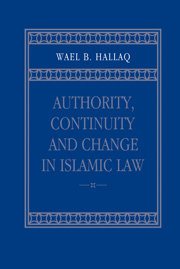Book contents
- Frontmatter
- Contents
- Preface
- 1 Juristic typologies: a framework for enquiry
- 2 Early ijtihād and the later construction of authority
- 3 The rise and augmentation of school authority
- 4 Taqlīd: authority, hermeneutics, and function
- 5 Operative terminology and the dynamics of legal doctrine
- 6 The jurisconsult, the author–jurist, and legal change
- Summary and conclusions
- Bibliography
- Index
3 - The rise and augmentation of school authority
Published online by Cambridge University Press: 27 July 2009
- Frontmatter
- Contents
- Preface
- 1 Juristic typologies: a framework for enquiry
- 2 Early ijtihād and the later construction of authority
- 3 The rise and augmentation of school authority
- 4 Taqlīd: authority, hermeneutics, and function
- 5 Operative terminology and the dynamics of legal doctrine
- 6 The jurisconsult, the author–jurist, and legal change
- Summary and conclusions
- Bibliography
- Index
Summary
That the so-called founders were not truly absolute mujtahids, and that they did not exercise ijtihād across the board, is a finding that has serious implications. So does our conclusion, in chapter 2, that the authority of the so-called founders was largely a later creation, partly drawn from attributions to the eponyms by their successors, and partly a later denial of the significant contributions made by the earliest jurists to the formation of the eponyms' doctrines. One important implication of these findings is that the schools that were attributed to the imams did not rely on their talents as high-caliber mujtahids or, at any rate, as mujtahids of a special kind. There were many jurists like them during the formative period, which began at the end of the first/seventh century and continuedtill the middle of the fourth/tenth. Obviously, not one of them, founder of a school or not, constructed his doctrine out of a sociological and legal-jurisprudential vacuum. They studied law with previous generations of legal scholars and transmitted from them a cumulative doctrine which encompassed both authoritative and less authoritative opinions. Of course, they reformulated part of this cumulative doctrine, and hence contributed to the creation of khilāf, the corpus juris of disagreement.
- Type
- Chapter
- Information
- Authority, Continuity and Change in Islamic Law , pp. 57 - 85Publisher: Cambridge University PressPrint publication year: 2001



